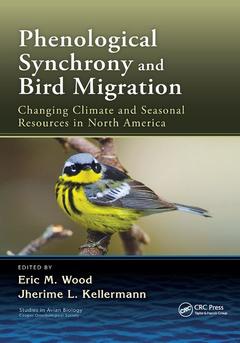Description
Phenological Synchrony and Bird Migration
Changing Climate and Seasonal Resources in North America
Studies in Avian Biology Series
Coordinators: Wood Eric M., Kellermann Jherime L.
Language: English
Keywords
Stopover Site; Global Change Biology; global; Stopover Habitat; change; National Academy; biology; Spring Migration; stopover; Archilochus Colubris; sites; Northern Red Oak; spring; Phenological Synchrony; avian; Phenological Mismatch; climate; Avian Biology; migratory; Migration Phenology; songbirds; Cumulative Growing Degree Days; Migrant Songbirds; Foraging Substrates; Junco Hyemalis; Short Distance Migrants; Great Lake; Autumn Migration; Zonotrichia Leucophrys; Hermit Thrush; Nature’s Notebook; Tree Phenology; Bur Oak; Niche Breadth; Red Maple
Publication date: 12-2017
· 17.8x25.4 cm · Paperback
Publication date: 02-2015
· 17.8x25.4 cm · Hardback
Description
/li>Contents
/li>Readership
/li>Biography
/li>
Bird migration is a well-researched phenological event. However, few studies in North America have investigated the effects of climate change and extreme weather on the relationships of migratory avian species and their seasonal resources. This is a critical gap in knowledge that limits our ability to prioritize management and conservation applications throughout the annual cycle. Phenological Synchrony and Bird Migration: Changing Climate and Seasonal Resources in North America explores critical linkages between migratory birds, their seasonal resources, and shifts in climate change and weather events.
Gathered from projects conducted during spring or fall migration, the book covers topics such as:
- Conservation and management considerations for migratory birds throughout the United States with respect to climate change
- The relation of climate on the wintering grounds to spring migration of short- and long-distance migratory birds
- The relationships of migratory birds and their seasonal resources, and the nature of these relationships in the face of climate change and extreme weather events at stopover habitats in both spring and fall migration
With contributions from over 40 researchers, and published in collaboration with and on behalf of the American Ornithological Society, this volume in the highly-regarded Studies in Avian Biology series will help readers understand the effects of climate change on migratory birds and will provide a solid basis for further inquiry and research in this area.
Conservation and Management. Leaps, Chains, and Climate Change for Western Migratory Songbirds. Landbird Stopover in the Great Lakes Region: Integrating Habitat Use and Climate Change in Conservation. A Bird’s-Eye View of the USA National Phenology Network: An Off-the-Shelf Monitoring Program. Migratory Connectivity. Spring Resource Phenology and Timing of Songbird Migration across the Gulf of Mexico.Climate on Wintering Grounds Drives Spring Arrival of Short-Distance Migrants to the Upper Midwest. Spring Migration. Phenological Asynchrony Between Migrant Songbirds and Food Resources during Early Springs: Initiation of a Trophic Cascade at a Stopover Site. Climatic Extremes Influence Spring Tree Phenology and Migratory Songbird Foraging Behavior.Phenological Synchrony of Bird Migration with Tree Flowering at Desert Riparian Stopover Sites.Shorebird Migration in the Face of Climate Change: Potential Shifts in Migration Phenology and Resource Availability. Fall Migration. Matching Ephemeral Resources on Autumnal Stopover and the Potential for Mismatch.Annual Variation in Autumn Migration Phenology and Energetic Condition at a Stopover Site in the Western United States.Autumn Migration of North American Landbirds. Index.
Dr. Eric M. Wood is a postdoctoral quantitative ecologist in the Conservation Sciences Program at the Cornell Lab of Ornithology. His research investigates the impacts of land use and climate change on species’ interactions with their environment. Dr. Wood has over 15 years experience in avian ecology, exploring questions related to spring and fall migration and the breeding period to better understand species-habitat interactions, community and landscape ecology, ecosystem services, and phenology.
Dr. Jherime L. Kellermann is an assistant professor in the Natural Sciences Department at the Oregon Institute of Technology and science coordinator at Crater Lake National Park Science and Learning Center. He has nearly 20 years of experience in research and conservation of birds and their habitats in America’s Pacific Northwest, Southwest, and Hawaii, as well as the Caribbean and Latin America. His research interests include seasonal dynamics of animal migration and habitat ecology, the synchrony or mismatch of interacting species’ phenology associated with climate variation and change, and how changing phenology may impact ecosystem services.




